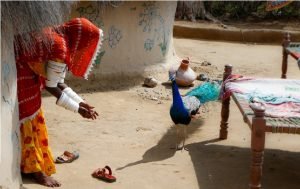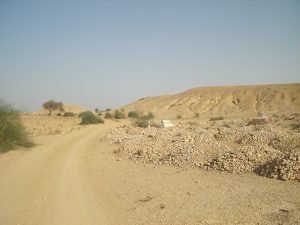
In 2019, I was the lead part of the UNFPA-FPAP assignment on Gender-based violence in an emergency at Tharparkar-Sindh a remarkable experience to work with vulnerable communities of the most diversified region of the country. It was the best learning opportunity for me to differentiate and compare the socioeconomic, health, and environmental compulsions with other regions, as I also belong to one of the disaster-prone regions of Sindh. The assignment focused to discuss gender-based violence in emergencies with root causes, impacts on reproductive health, and screening of SRH-GBV survivors in targeted union councils. Tharparkar is a vast disaster-prone desert region of Pakistan positioned in Sindh province spread on both sides of Pakistan and India. The religious minatory (Hindo) is the majority population of the region. The Thar Desert is spread over 19637 km square kilometers, with a population of about 1.65 million people and around 70% population economically depends on rain cultivation and livestock rearing.
This region holds the worst history of extensive drought spells and people had terrible experiences abide the adverse impacts of the drought situation. Multiple reasons can be counted behind poor socioeconomic and health indicators while women, children, and adult girls consider the most vulnerable and neglected segments. The community explained the correlation and intensity of violence between starvations in their own way during my group discussion. The team used interactive tools to collect participants’ responses on sensitive topics. On many occasions, the participants were looking terrified and were reluctant to share the violent behavior of males in their presence.
In Tharparkar repeated drought-like situations further escalate the violence against women when the family head becomes jobless while restrained financial conditions turn his attitude violent that leading to heighten the intensity of domestic violence. In particular circumstances, women, children, and adult girls whose fundamental rights are already suppressed become more vulnerable which deeply affects their social, economic, mental, and sexual wellbeing. During the medical camps and screening of GBV survivors, the numbers of women of identified as patients of depression, dysthymia, conduct disorder and undernourishment, and victim of physical violence affected reproductive health adversely. The female socio-physiologic counselor had to develop trust-building and confidentiality with women to unfold fierce stories of gender-based violence. We can easily guess the viciousness of our gender-biased cultural norms making it difficult for women to express their pain.
In an adversative drought-like situation, despite sharing in household income the overburdened women and adult girls get the least share in family food quite insufficient for the dilatory needs of pregnant and lactating women. Early child marriage and exchange marriage are the most common and worst forms of sexual gender-based violence happenings in the desert regions like in other parts of the country. Article 16 of the Universal Declaration of Human Rights states that persons must be at “full age” when married and that marriage should be entered into “freely” and with “full consent. The intensity of reproductive health complications of early child marriage in drought- areas is quite divergent comparatively to other regions due to socioeconomic and geographical vulnerability.
In the widespread desert area, government Family health care clinics are set distant and incapable to address the unmet needs of outreached clients due to restraint trained humans, equipment, financial resources and continuous supplies of contraception. Religious-based misconceptions are another big challenge to establish a link between poverty and poor health with the increasing population. The government health facilities and dispensaries don’t have continuous supplies of contraceptives and availability of life-saving drugs along with nutritional supplements / multi-vitamins, laboratory, and well-equipped labor rooms. Despite attractive hard area incentives to female medical staff, a big challenge is still there to ensure the availability of competent female gynecologists and nursing staff at remote Taluka Hospitals for safe child delivery to reduce child mortality and address delivery-related complications. Large numbers of people continue to avail services of the traditional birth attendants (TBA) accessible to them, though many of them are untrained and unfamiliar with using hygiene delivery kits for safe delivery.
In drought-like situations, countless families temporarily migrate to agriculturally rich areas of Sindh for crop harvesting and daily wedge labor work to earn some money for family and livestock survival. It is a most terrible time for families, especially for women and adult girls to live and work in highly unprotected environments further exposing them to child abuse, and sexual and financial exploitation. In the state of isolation women and adult girls’ access to reproductive health services become challenging particularly for family planning method user client women to maintain the Family planning cycle especially long-acting reversible contraceptives (LARCs) or to receive routine treatment for gynecological complaint. It has been observed that in a drought when a large number of males turned to be jobless and limited to homes, resultantly many women who were using the family planning method without the consent of partners had conceived due to discontinuing family planning method.
Proficiency and knowledge of health service providers around (MISP) and GBV services need to increase significantly to improve competency level and quality services bringing them out from social stigma as well. The conceptual and legal capacity of key stakeholders also needs to enhance around early child marriage restrains acts, hindo marriage acts, and sexual gender-based violence which lead to reproductive health issues. It was revealed in the multi-stakeholder meeting at Tharparkar held by UNFPA-FPAP that the concerned department and community were unaware of the legal and social aspects of the abovementioned acts. How someone can raise a complaint against early child marriage or sexual assault without knowing the proper law? if the concerned department doesn’t know the legal aspects of the act then how does he/she register complaints properly?
UNFPA is working on its innovative model under women health friendly space (WHFS) aimed to provide learning and recreational space to women where they may educate about reproductive health and other rights issues. The two women health friendly spaces (WFHS) set in Tharparkar as well by UNFPA in his project produced very positive outcomes. Socially depressed women need a conducive and refreshing environment to get strength by learning and doing. Community women and adult girls were visiting those WFHS often to seek counseling on reproductive health issues. Extreme poverty and unawareness are two major drivers pushing poor people to unqualified and unregistered family health service providers making their health issues more complicated.
Universally recognized minimum initial services package (MISP) must be integrated into our disaster response strategy to ensure women and adult youth and boys’ access to reproductive health services in drought troubled region of Tharparkar and other affected regions as well. It will pave a path to recognize reproductive health as fundamental women’s right.

Email: abdullghaffar910@gmail.com l +92-306 -8581532 Skype ID Gthaheem@gmail.com
